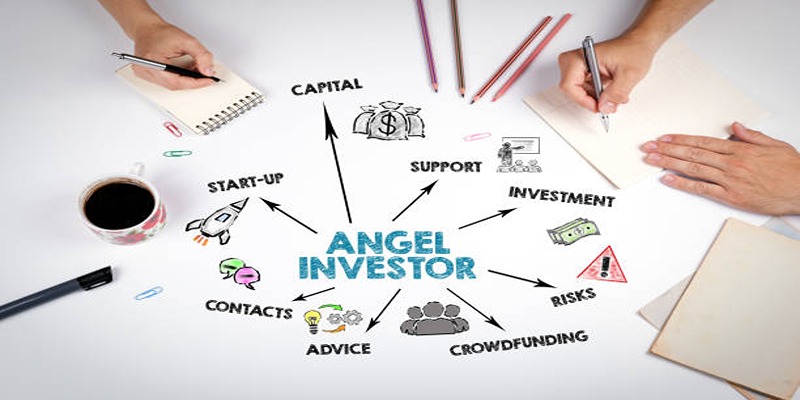When starting a business, funding is one of the biggest challenges for entrepreneurs. Two common ways to raise money are through angel investors and venture capitalists. These are individuals or groups who provide funds to help businesses grow, but they do so in different ways and with different goals. Understanding how they work and what they offer can help you choose the right option for your business. This guide will explain the basics of angel investors and venture capitalists to make things easier for beginners.
What is an Angel Investor?

Angel investor or private investor or the angel funder is a person who invests own money in startup ventures or small businesses. Just like most venture capitalists, they offer the funds required to launch a business, known as the seed capital. An angel financier typically means a wealthy person with some amount of cash, who wishes to invest in some promising business. In addition to the funding, you will get the support and advice from professionals in the given industry.
Pros of Angel Investors
- Easier access to funding: Angel investors invest their own money so they do not set rigid investment guidelines, they also are easier to approach as compared to other investors.
- Involvement in business operations: Angel investors will provide funding to a business and will sometimes get involved with the business and offer suggestions and contacts.
- Faster decision making: This is because angel investors are usually single individuals and not big firms which can take ages to approve a project.
Cons of Angel Investors
- Less money available: Angel investors, as individuals, often have limited capital to invest. This can make it challenging for them to provide the substantial funding a business might require.
- Higher expectations: Angel investors often expect high returns on their investment, which can put pressure on the entrepreneur to meet certain milestones and achieve success quickly.
- Potential for conflicts: As angel investors are more involved in the business, there may be differences in opinions or conflicts that arise during decision making.
When to Consider Angel Investors?
Angel investors are a better source of funding for early-stage companies that are still experiencing exponential growth; however, they may lack capital from conventional(financial and business institutions such as banks and accredited venture capital firms). It can also be comfortable for those personalities who appreciate the presence of the big strong hand; when you do not need just money, but also advice, and the investor is ready to walk with you through thick and thin.
What is Venture Capital?
Venture capital (VC) is a form of investment where funds are provided by firms or groups of investors to startups and small businesses that have the potential for rapid growth. Unlike angel investors, venture capitalists invest other people's money rather than their own personal wealth. They typically provide larger amounts of funding at later stages of a business's development when it is ready to scale.
Pros of Venture Capital
- Larger amounts of funding: As venture capitalists invest other people's money, the amount of capital they can provide is usually much larger compared to angel investors.
- Expertise and networking opportunities: Venture capitalists often have a team of experts in various industries who can provide guidance, connections, and resources to help businesses grow.
- Long-term partnerships: Venture capitalists are interested in long-term partnerships with businesses and are willing to take risks for potential high returns.
Cons of Venture Capital
- Highly selective: Venture capitalists receive numerous pitches from entrepreneurs but only fund a small percentage. They have strict criteria for investing and may not be interested in certain industries or business models.
- Loss of control and ownership: As venture capitalists provide larger amounts of funding, they often require a higher stake in the business which can lead to loss of control and ownership for the entrepreneur.
- Pressure to meet expectations: Similar to angel investors, venture capitalists also have high expectations for returns on their investment, putting pressure on the entrepreneur to achieve success quickly.
When to Consider Venture Capital?
Venture capital is best suited for startups that have already established a strong foundation and are ready to scale their business. It is also ideal for businesses with high growth potential in industries such as technology or healthcare where large amounts of capital are needed for research and development.
How to Decide Which Is Right for Your Startup
When considering whether to seek funding from angel investors or venture capitalists, it's important for entrepreneurs to carefully consider their business goals and the potential benefits and drawbacks of each option. Here are a few key factors to keep in mind:
- Stage of Business: If your business is still in the early stages and needs seed money to get off the ground, angel investors may be a better fit. If your business has already established a strong foundation and is ready for rapid growth, venture capital may be more suitable.
- Industry and Market: Certain industries and markets may be more attractive to one type of investor over the other. For example, technology startups may fare better with venture capital while consumer products may be better suited for angel investment.
- Personal Preferences: Think about what you value in an investor, whether it's a personal relationship, mentorship and guidance, or a more hands-off approach.
Ultimately, the decision should be based on aligning your business goals and needs with the resources and support that each type of investor can provide.
Angel Investors vs. Venture Capitalists: What’s the Difference?

- Source of funding: Angel investors use their personal funds whereas venture capitalists invest other people's money.
- Investment size: Angel investors usually contribute smaller seed funding, whereas venture capitalists provide larger investments at later stages.
- Involvement in business operations: Angel investors often take a more active role in the businesses they invest in, while venture capitalists tend to have a more hands-off approach.
- Criteria for investment: Because angel investors use their own money, they may be less selective in their investment criteria compared to venture capitalists who must answer to their investors.
- Long-term goals: Angel investors may be more patient with returns on their investment, while venture capitalists typically have a shorter time frame for seeing a return on their investment.
Final Thoughts
Choosing between angel investors and venture capital is a pivotal decision that can shape the trajectory of your business. By evaluating your business's current stage, industry demands, and your personal preferences, you can make an informed choice that aligns with your long-term goals. Remember, the right partnership is about more than just funding—it's about finding investors who believe in your vision and can provide the right blend of resources and strategy to help your business thrive.







